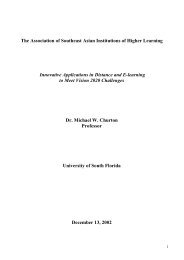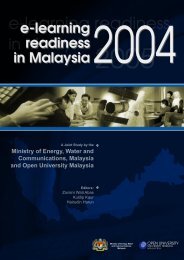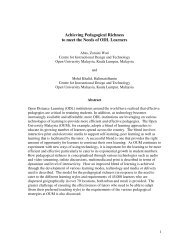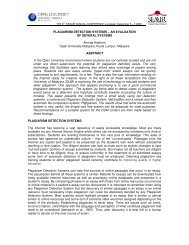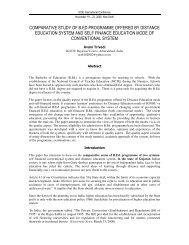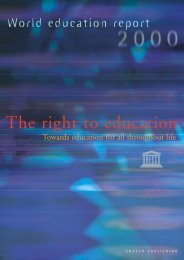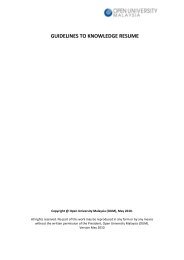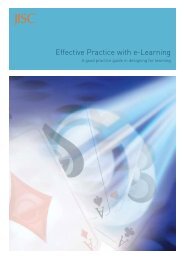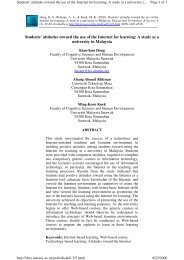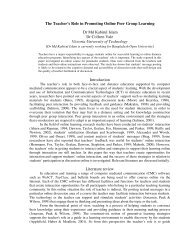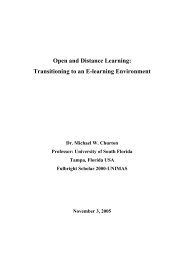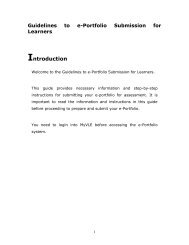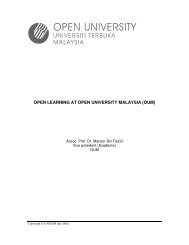Nuffic (the Netherl<strong>and</strong>s NARIC/ENIC) plays a crucial role in recognition. Because ofits focus on foreign target groups in many of its activities, Nuffic provides informationon the Dutch <strong>education</strong>al system in general <strong>and</strong> specific programmes targeted at theforeign student body in particular to foster incoming mobility. Nuffic hosts a Web site toinform potential students on “Study in the Netherl<strong>and</strong>s” (www.studyin.nl). The numberof e-<strong>learning</strong> courses is still very limited in the Netherl<strong>and</strong>s. As a consequence, theseprogrammes are not included in this database. In addition, in the context of a pilot projectof the ENQA <strong>and</strong> the ENIC/NARIC networks, Nuffic has developed a Web site in cooperationwith the NVAO which explains the quality assurance <strong>and</strong> accreditation facilitiesin the Netherl<strong>and</strong>s from the perspective of the foreign student. The Web site covers boththe regular national <strong>education</strong> system <strong>and</strong> the private sector. It also tries to help studentsto ask the relevant institutions the right questions before starting a study programmein the Netherl<strong>and</strong>s. This Web site will be launched in 2005 (www.nuffic.nl/qa-in). ThisWeb site does not specifically address e-<strong>learning</strong>; nevertheless, providers of e-<strong>learning</strong>programmes can use the Web site to find out which issues need to be addressed in theirstudy programme information.To foster outgoing mobility, Nuffic promotes all the relevant tools <strong>and</strong> activitiesdeveloped or identified by the NARIC/ENIC networks in the Netherl<strong>and</strong>s. In the 1990s itpromoted the Diploma Supplement <strong>and</strong> ECTS, as well as application of the methodologyof the Lisbon Recognition Convention (although the Dutch government had not yetratified the Convention). The Diploma Supplement aims to promote transparency <strong>and</strong>recognition of <strong>higher</strong> <strong>education</strong> qualifications for academic <strong>and</strong> professional purposes.UNESCO-CEPES has developed a template that can be used by institutions to provideall the required information about a study programme to enhance recognition. Otherexamples of relevant tools to be promoted are the Code of Good Practice in theProvision of Transnational Education <strong>and</strong> the Recommendation on the Recognition ofJoint Degrees, both official documents of the Lisbon Recognition Convention regime.Furthermore, Nuffic offers two credential evaluation products for students who haveearned a Dutch diploma. First of all there is the equivalence letter, which containsinformation that answers the questions most frequently asked by credential evaluatorsin other countries. Second, there is the diploma description, which is issued on requestto individual graduates. This documents provides information about the Dutch studyprogramme that was followed.Lastly, accreditation <strong>and</strong> international recognition are being integrated in another, uniqueway. Because both Fl<strong>and</strong>ers <strong>and</strong> the Netherl<strong>and</strong>s integrated their accreditation systemsfor <strong>higher</strong> <strong>education</strong> programmes into one organisation based on a bilateral agreement,the two NARICs/ENICs (the Fl<strong>and</strong>ers Ministry of Education <strong>and</strong> Nuffic) decided toinvestigate the possibilities of automatic recognition of each other’s national degrees<strong>and</strong> even the automatic recognition of each other’s recognition statements regardingcredentials from third countries. After the necessary consultation rounds with the relevantstakeholders in both countries, the Flemish <strong>and</strong> Netherl<strong>and</strong>s NARICs/ENICs willcommence their co-operation in mid-2005. In this way, common accreditation will resultin a common recognition (or evaluation) area.IDENTIFICATION, ASSESSMENT AND RECOGNITIONOF PRIOR LEARNINGAs a consequence of the Bologna process, recognition of <strong>lifelong</strong> <strong>learning</strong> has also grownin importance. The <strong>education</strong> ministers have included this concept in the Bologna processin Prague in 2001. This poses a major challenge to credential evaluators especially if126
the qualification resulting from the various <strong>lifelong</strong> <strong>learning</strong> forms do not belong to theformal school system that is covered by national quality assurance <strong>and</strong> accreditationmechanisms.To foster incoming mobility, it is important that facilities for international credentialevaluation <strong>and</strong> the assessment of prior <strong>learning</strong> exist both at the institutional level, e.g.at the admissions offices of <strong>education</strong>al institutions, <strong>and</strong> at the national level, e.g. atnational information centres (NARICs or ENICs), which in many countries play a crucialrole in credential evaluation. Credential evaluation is one of the main instruments forrecognising incoming mobility. Recognition of foreign credentials can be required forvarious reasons. Generally, a distinction is made between academic <strong>and</strong> professionalrecognition. Academic recognition is when someone wishes to be admitted to a courseof <strong>education</strong> or use their academic title in the receiving country. Professional recognitionrefers to situations when someone wishes to enter the labour market or obtain permissionto work in a regulated profession in the receiving country. Regulated professionsare legally protected, which means that an appointed institution has to recognise theprofessional competence of an applicant before he or she is allowed to work in theprofession. The most important legal instrument to improve academic recognition isthe Lisbon Recognition Convention. European Directives have been developed for thepromotion of professional recognition.Nuffic has been responsible for the credential evaluation of <strong>higher</strong> <strong>education</strong> diplomas<strong>and</strong> degrees for several decades. It serves Dutch institutions of <strong>higher</strong> <strong>education</strong>,ministries <strong>and</strong> governmental bodies. Based on the credential evaluation, final decisionson admission to <strong>education</strong>al courses or access to professions are taken by the authoritiesconcerned. To answer individual requests for international credential evaluation, Nufficis part of the Dutch international credential evaluation structure. Individuals can requestcredential evaluation at some 125 regional centres.However, with the advent of <strong>lifelong</strong> <strong>learning</strong>, national credential evaluation offices(NARICs/ENICs) are confronted with a new <strong>and</strong> major challenge. As alreadymentioned, new forms of <strong>education</strong>, such as transnational <strong>education</strong>, virtual courses,various types of post-initial <strong>education</strong> <strong>and</strong> work-based <strong>learning</strong> are emerging. It isacknowledged <strong>and</strong> encouraged that people continue to learn after completing initial<strong>and</strong> post-initial formal study programmes that result in nationally recognised diplomas.Lifelong <strong>learning</strong> takes place in a large range of different <strong>learning</strong> environmentsof varying formality. European policies therefore call for all of these forms of<strong>learning</strong> to be recognised. Due to these developments, Nuffic has identified the needfor a methodology to link international credential evaluation <strong>and</strong> the recognitionof competencies, internationally referred to as Prior Learning Assessment <strong>and</strong>Recognition (PLAR) or Assessment of Prior Learning (APL). In situations whenforeign qualifications are not recognised, or additional information about a person’scompetencies is required in the recognition process, assessment instruments thatevaluate all forms of <strong>learning</strong> should be used (Nuffic, 2001).In the case of <strong>distance</strong> <strong>education</strong> qualifications, as long as these are part of a nationallyrecognised or accredited <strong>education</strong> system, the qualifications are evaluated in the sameway as qualifications awarded by other institutions belonging to the traditional <strong>education</strong>system. However, if this is not the case <strong>and</strong> international credential evaluators areunable to find sufficient information on the quality or status of the provider or the studyprogramme that was followed, it will not be possible to evaluate the <strong>distance</strong> <strong>education</strong>qualification, <strong>and</strong> a PLAR procedure would be recommended to find out what the personin question has learned.127
- Page 1 and 2:
PERSPECTIVES ONDISTANCE EDUCATIONLi
- Page 3 and 4:
The Commonwealth of Learning (COL)
- Page 5 and 6:
ACKNOWLEDGEMENTSIn addition to the
- Page 7 and 8:
These are some of the issues that a
- Page 9 and 10:
What are the trends and issues in l
- Page 11 and 12:
of policy implications relating to
- Page 13 and 14:
evince important differences that c
- Page 15 and 16:
inequitable regulations governing t
- Page 17 and 18:
associations and groups of countrie
- Page 19 and 20:
THE CONTRIBUTORChristopher McIntosh
- Page 21 and 22:
INTRODUCTIONIn his 1996 report to U
- Page 23 and 24:
Lastly, our analysis of the situati
- Page 25 and 26:
diploma or similar certificates of
- Page 27 and 28:
force of the undertaking. Here agai
- Page 29 and 30:
RELEVANT INTERNET SITESUNESCO Task
- Page 31 and 32:
Notes1. This phrasing has been used
- Page 33 and 34:
goals (Daniel, 1996). Lifelong lear
- Page 35 and 36:
eported that group activity had red
- Page 37 and 38:
NEW AREAS FOR DISTANCE EDUCATION:WO
- Page 39 and 40:
targets systematically for the use
- Page 41 and 42:
Rausch, A.S. (2003). A case study o
- Page 43 and 44:
correspondence teaching systems tha
- Page 45 and 46:
significant differences between syn
- Page 47 and 48:
In distance flexible- and blended-e
- Page 49 and 50:
STATE-FUNDED DUAL-MODE SYSTEMS ATUN
- Page 51 and 52:
Table 4.2: Fundable elements in dis
- Page 53 and 54:
sciences in 21 countries of the reg
- Page 55 and 56:
How a system is funded depends in p
- Page 57 and 58:
Litto, Fredric M. (2004). Digital l
- Page 59 and 60:
CHAPTER 5LIFELONG LEARNING IN THE A
- Page 61 and 62:
education, which was initiated by C
- Page 63 and 64:
So the virtual classroom acted as a
- Page 65 and 66:
In June 2002, when the course came
- Page 67 and 68:
RELEVANT INTERNET SITESFORCIIR proj
- Page 69 and 70:
11. The approximate rate for 1€ w
- Page 71 and 72:
The term modern distance education
- Page 73 and 74:
the National Networked Consortium f
- Page 75 and 76:
important resource for undeveloped
- Page 77 and 78:
standards have been proposed for th
- Page 79 and 80: The development of e-learning withi
- Page 81 and 82: RELEVANT INTERNET SITESCCRTVU Onlin
- Page 83 and 84: MoE (2004b) The Notice on Running N
- Page 85 and 86: CHAPTER 7QUALITY ASSURANCE SURVEYOF
- Page 87 and 88: (Paris, France, 28-29 June 2004) in
- Page 89 and 90: Examples of elaborated QA policies:
- Page 91 and 92: plans and produces its conventional
- Page 93 and 94: SHTVU (China)• Teaching• Teachi
- Page 95 and 96: offers its programmes to Turkish ci
- Page 97 and 98: mega universities apply a set of st
- Page 99 and 100: RELEVANT INTERNET SITESThe Commonwe
- Page 101 and 102: 2. QA initiatives or publications b
- Page 103 and 104: assurance of ODL. This DST will be
- Page 105 and 106: Educational Planning has been respo
- Page 107 and 108: A system of weighting of the key qu
- Page 109 and 110: RELEVANT INTERNET SITESHigher Educa
- Page 111 and 112: CHAPTER 9THE FINNISH VIRTUAL UNIVER
- Page 113 and 114: foreign providers. In Finland, the
- Page 115 and 116: to make the best use of new educati
- Page 117 and 118: The foremost task for the Service U
- Page 119 and 120: part of quality management. The aim
- Page 121 and 122: online courses; an educational tech
- Page 123 and 124: polytechnics, research institutions
- Page 125 and 126: CHAPTER 10PROMOTING CROSS-BORDERREC
- Page 127 and 128: The Bologna Declaration was followe
- Page 129: indicators currently being used for
- Page 133 and 134: Table 9.1: Outline of the portfolio
- Page 135 and 136: • Make sure that incoming student
- Page 137 and 138: CHAPTER 11CHARTING THE EVOLUTIONOF
- Page 139 and 140: Another common characteristic was t
- Page 141 and 142: the current capacity of the educati
- Page 143 and 144: conditions for success. Conditions
- Page 145 and 146: Cultural and ethical issues in inte
- Page 147 and 148: the cost and maintenance of learnin
- Page 149 and 150: Research can be a useful tool for c
- Page 151 and 152: REFERENCESBates, A. (1995). Technol
- Page 153 and 154: Twigg, C. (2001). Quality Assurance
- Page 155 and 156: y, for example, entering into partn
- Page 157 and 158: and even greater steps, and the dec



